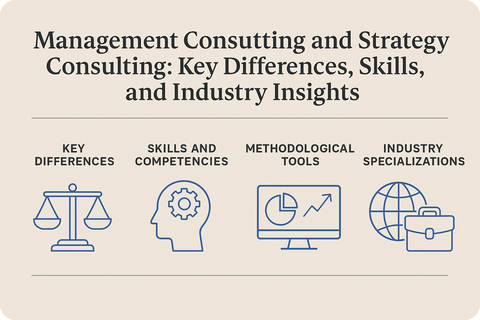Management Consulting and Strategy Consulting: Key Differences and Insights for Business Success
Understanding the Unique Roles and Services of Management Consulting and Strategy Consulting

Introduction
In the world of business consulting, two major disciplines often emerge: management consulting and strategy consulting. While these terms are often used interchangeably, they represent distinct approaches with varying goals, tools, and outcomes. This article explores the differences between these two consulting domains, offering insights into their unique roles in business growth and transformation. We will also delve into the skills and methodologies employed by consultants in both fields.
What is Management Consulting?
Management consulting focuses on improving organizational performance and efficiency. Consultants in this field work with businesses to enhance operational processes, optimize resource use, and improve overall productivity. These consultants typically specialize in specific functional areas within an organization, such as operations, technology, human resources, or finance.
Key Areas in Management Consulting
-
Business Process Improvement: Enhancing operational workflows to reduce inefficiencies.
-
Organizational Development: Reshaping the structure and culture of the company to foster growth and adaptability.
-
Change Management: Helping businesses navigate organizational changes smoothly.
-
Risk Management: Identifying, assessing, and mitigating potential risks.
-
Supply Chain Optimization: Streamlining the supply chain to reduce costs and improve delivery times.
Management consultants use a variety of methodological tools such as SWOT analysis, PESTLE analysis, Six Sigma, and Balanced Scorecard to assess business processes and recommend improvements.
What is Strategy Consulting?
Strategy consulting focuses on helping businesses develop and implement long-term strategies. These consultants work closely with senior leadership teams to understand business goals and create plans that guide organizations toward achieving their vision. Unlike management consultants, who often focus on operational issues, strategy consultants deal with broader, high-level objectives such as market positioning and competitive advantage.
Key Areas in Strategy Consulting
-
Strategic Planning: Developing long-term plans to help businesses achieve their goals.
-
Market Entry Strategy: Creating strategies for entering new markets or industries.
-
Business Model Innovation: Rethinking the way a business creates, delivers, and captures value.
-
Growth Strategy: Developing plans for expanding a company’s footprint.
-
Brand Positioning: Identifying and establishing the unique identity of a brand in the market.
Analytical tools like Porter’s Five Forces, BCG Matrix, and Ansoff Matrix are frequently used by strategy consultants to evaluate competitive environments and strategic options.
Key Differences Between Management Consulting and Strategy Consulting
While both types of consultants aim to improve business performance, they approach the task from different angles.
Focus Areas
-
Management Consulting focuses on improving operational efficiency and solving specific business challenges, such as streamlining processes and reducing costs.
-
Strategy Consulting deals with overarching business strategies that guide long-term decisions, like market positioning and growth plans.
Client Engagement
-
Management Consultants typically engage with mid-level managers and department heads to make improvements in specific areas of the organization.
-
Strategy Consultants work closely with C-suite executives, advising on high-level decisions related to the company’s vision and direction.
Methodologies and Tools
-
Management Consulting: SWOT Analysis, Business Process Reengineering (BPR), Key Performance Indicators (KPIs), Cost-Benefit Analysis.
-
Strategy Consulting: Porter’s Five Forces, Value Chain Analysis, Business Model Canvas, Scenario Planning.
Skills and Competencies Required for Management and Strategy Consultants
Both management consultants and strategy consultants require a diverse set of skills, but some are unique to each field.
Essential Skills for Management Consultants
-
Problem-Solving: Ability to identify problems within an organization and devise practical solutions.
-
Project Management: Expertise in managing complex projects with multiple stakeholders.
-
Process Improvement: Knowledge of lean management and continuous improvement methodologies.
-
Analytical Thinking: Strong ability to assess data and make informed decisions.
Essential Skills for Strategy Consultants
-
Strategic Thinking: The ability to see the big picture and anticipate future trends.
-
Market Analysis: Understanding market forces and how they impact business performance.
-
Leadership: Leading organizations through significant changes and strategic initiatives.
-
Financial Acumen: Ability to evaluate financial data and its impact on strategic decisions.
Industry Specializations in Consulting
Both management consulting and strategy consulting cover various industries, but their approaches differ in terms of focus.
Management Consulting Industry Specializations
-
Healthcare Consulting: Improving healthcare services and operational management.
-
Financial Services Consulting: Helping banks, insurance companies, and investment firms optimize their processes.
-
Manufacturing Consulting: Optimizing production processes, supply chains, and inventory management.
-
Technology Consulting: Advising businesses on implementing IT systems and digital solutions.
Strategy Consulting Industry Specializations
-
Global Strategy: Guiding businesses in international expansion and global market positioning.
-
Sustainability Strategy: Developing strategies that promote environmental sustainability while driving business success.
-
Digital Transformation Strategy: Helping businesses adapt to digital technologies and incorporate innovation into their strategy.
-
Brand Strategy: Crafting strategies that position a company’s brand effectively in the market.
Trends in Management Consulting and Strategy Consulting
Management Consulting Trends
-
Artificial Intelligence Integration: Incorporating AI to improve decision-making processes.
-
Agile Methodologies: Using agile practices to enhance business flexibility and responsiveness.
-
Cloud Computing: Shifting operational processes to cloud-based systems to improve efficiency.
Strategy Consulting Trends
-
Digital Strategy: Developing strategies for navigating the digital landscape.
-
Blockchain Strategy: Exploring how blockchain can enhance security and efficiency in business operations.
-
Sustainability Strategies: Incorporating sustainable practices into business strategies for long-term growth.
Conclusion
In conclusion, management consulting and strategy consulting are essential components of a company’s success. While management consulting focuses on improving day-to-day operations and efficiency, strategy consulting provides a long-term vision for growth and market positioning. Understanding the differences between these consulting services helps businesses choose the right approach for their needs.
FAQ
Q1: What is the difference between management and strategy consulting?
A1: Management consulting focuses on improving operational efficiency and solving specific organizational challenges, while strategy consulting focuses on long-term business strategies, market positioning, and growth plans.
Q2: Which consulting service is more suitable for a startup?
A2: Startups can benefit from both services—strategy consulting for long-term growth and market entry strategies, and management consulting for optimizing internal processes and operations.
Q3: Do I need both management and strategy consultants?
A3: Yes, many businesses benefit from both types of consultants. Management consultants can help optimize day-to-day operations, while strategy consultants provide a roadmap for long-term success.
This article aims to provide a clear understanding of the differences between management consulting and strategy consulting, offering insights into their unique methodologies, industries served, and skills required.



